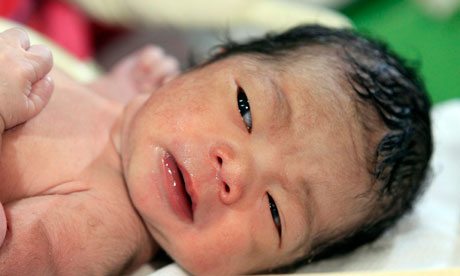On Oct 31, 2011, the world’s 7-billionth baby was born. As The Guardian reports, Danica May Camacho, a girl born in the Philippine capital Manila, is chosen by UN to symbolically mark global population milestone.
The United Nations chose Danica May Camacho as the seven billionth baby to symbolically represent the global population milestone.
Here she is:
How Long Did it Take
As Kenneth R. Weiss, LA Times reports, it took only a dozen years for humanity to add another billion people to the planet, reaching the milestone of 7 billion Monday — give or take a few months.
Demographers at the United Nations Population Division set Oct. 31, 2011, as the “symbolic” date for hitting the seven billionth baby mark. Of course, they acknowledged that it’s impossible to know for sure the specific time or day.
Under any methodology, demographers agree that humanity remains on a steep growth curve, which is likely to keep climbing through the rest of this century. The U.N.’s best estimate is that population will march past 9.3 billion by 2050 and exceed 10.1 billion by the end of the century. It could be far more if birthrates do not continue to drop as they have in the last half-century.
>> Check out the Real Time World Statistics by Worldometers.
Nearly all the projected growth this century is expected to occur in developing countries in Asia, Africa, and Latin America, while the combined populations in Europe, North America and other wealthy industrialized nations will remain relatively flat.
Some developed countries, such as Germany, Russia, and Japan, have a downward trend.
Discussing population growth has turned up the flame on long-simmering debates about growth on a finite planet: Whether a growing population or growing consumption remains the biggest environmental challenge, how best to help lift a billion people out of poverty and misery, whether governments should provide contraception for those who cannot afford it.
Seven Billionth Baby – Are We Already Too Many
The new leader of the United Nations Population Fund, Dr. Babatunde Osotimehin, a Nigerian obstetrician-gynecologist, stepped gingerly into the fray. His agency remains a favorite punching bag of anti-abortion activists in the United States for its role in supporting family planning clinics in developing countries.
“Instead of asking questions like, ‘Are we too many?’ we should instead be asking, ‘What can I do to make our world better?’ ” wrote Osotimehin in the annual State of the World Population report. The report chronicles disparities between rich nations and poor ones. Poor countries continue to have all:
- low education levels
- startlingly high rates of teenage pregnancy and
- maternal and child deaths due to complications from childbirth.
“In many parts of the developing world, where population growth is outpacing economic growth, the need for reproductive health services, especially family planning, remains great,” Osotimehin concluded.
Some have used the occasion to celebrate the unrivaled success of the human species. Population grows when births exceed deaths. People are living longer and the number of infant deaths has dropped. Also, food supply is more secure, and we have witnessed advances in sanitation and medicine.
Sixth Billionth Baby
In 1999, his predecessor, Kofi Annan, designated a boy born to refugee parents in Sarajevo, Bosnia-Herzegovina, as Baby 6 Billion. Again, this was only symbolic and served to put a face to the population growth. Adnan Mevic has become something of a celebrity.
There is no word yet on how the United Nations will handle the next milestone when the globe’s population hits 8 billion — perhaps about 14 years from now.
How do you feel about the world carrying 7 billion people?
Check out our articles on The Dilemma of Population Growth, Happy World OverPopulation Day!, Transitional Ethics and Going Green

